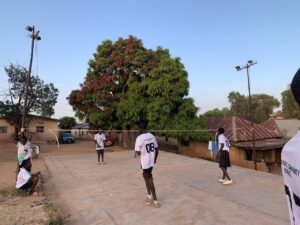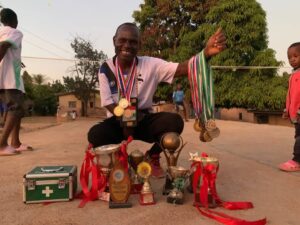The Young People Community Outreach (YPCO) is transforming youngsters in a Plateau State community grappling with drug abuse by nurturing local and African badminton champions.
Plateau, Nigeria – With a dense population and vibrant markets, Howlshe is a bustling neighborhood tucked in urban Jos, the capital city of Plateau State. Yet the thriving community is overshadowed by the problem of substance abuse, peculiar to its teenagers and young adults.
Mumkwaba Talatu Gomam, who was born with a physical disability, witnessed the ruinous effects of this addiction in the lives of many of his peers, who were beginning to sniff crack and meth. Amid this, young Mumkwaba took solace in badminton, a sport that was scarcely recognised in his community.
“I became interested in the game in 1993 because my elder brother was always playing with his friends. The swift movements, sharp reflexes, and mental focus the game demanded captured my heart,” he recounted. His overriding passion led him to learn the sport despite his physical handicap. “I took it to my boarding school, where I started practicing with a female classmate who was interested.”
Badminton became more than a sport for Gomam; it became a metaphor for life—teaching quick decision-making, calculated risks and purposeful living.
In a bid to break the cycle of drugs in his community, Mumkwaba launched a grassroots initiative in 2008 called Young People Community Outreach. He developed a piece of land beside his family house in the heart of the community into a makeshift badminton court. With recquets donated by well-wishers, he began coaching a handful of enthusiastic children in his neighbourhood.
Gomam has a preference for young trainees from “age two to fifteen because at that time, their brain is sharp, they can learn easily, and do great things,” he notes.

Research supports Gomam’s approach, showing that early childhood programs like YPCO can have lasting impacts on child development.
From Toddler to Champion
One of such young learners is Zina Mudima, who first gripped a badminton racket at only 2. Today, thanks to years of dedicated training from Gomam, the 13-year-old is one of the youngest players in Plateau State to hold two badminton championship titles.
“Badminton is not just a game to me; it’s like my heartbeat,” Zina says. “I didn’t just learn how to play; I learnt discipline, focus, and how to dream big.”
After years of tireless evening practices, Zina won his first community championship slam at seven, a feat that became a badge of honour for his family. He has since added seven more medals to his collection.
“Winning felt amazing,” Zina says, “but what made me prouder was seeing kids from the community come up to me and say, ‘I want to play like you.’ That’s when I realized I wasn’t just playing for myself. I was playing for my community.”
Overcoming Resistance
Not all parents embraced Gomam’s initiative at first. He recalls a particular incident of a father who believed that the game was a waste of time, merely distracting his eight-year-old son from his home duties. “One time the father threatened to arrest me with the police,” Mumkwaba recalls.
Seven years later, that same boy won his first state championship and was offered a position by the Plateau State Sports Council, much to the delight of his once-doubtful father.
“For the first time, he [the father] shook my hand with a big smile on his face and appreciated me. I was speechless. This was the same man who once harassed me for teaching his son,” Gomam said.
Recognising how the practice keeps their wards engaged and away from harmful influences, many other parents have encouraged the training in recent years.

Gomam had been holding his training sessions on the premises of a community church, but the church had had enough. “They asked us to stop coming because it was affecting the church activities,” he says.
Undeterred, he relocated to a small piece of fallow land entrusted to his father. Despite limited resources, support has trickled in.
“A woman I trained a few years ago is currently in the United States of America. She sent us 20 racquets,” he shares.
Yet, not all players continue after initial training. “Some kids quit because of discouragement from stadium coaches,” he laments.
A Far-Reaching Impact
Manasseh Umaru, an immigration officer, became enamoured by watching Gomam and the kids each evening after work. “At first, I was just watching from a distance. But something about the way Coach Mumkwaba handled those kids—his patience, his encouragement—drew me in,” he noted.
I believe the program is not just shaping champions but also fostering a new generation of responsible citizens,” Umaru, who has recently joined Gomam’s training squad, says.
Gomam’s influence extends beyond Howlshe. Mary Gideon, one of his trainees, is now a decorated para-badminton player representing Nigeria internationally.
“Coach Mumkwaba is a national para-badminton champion and recently represented Nigeria in Uganda,” says the badminton head coach, Plateau State Sport Council, Kwaks Enoch Bernard, who also commended Gomam for training amputee football players too.
Under Gomam’s leadership, YPCO has won numerous competitions, including both male and female categories of the 2018 Zonal Presidential Games. The team is now preparing for an upcoming tournament in Bayelsa State.
“For us, victories are not just personal triumphs—they are a source of inspiration for other children in the community who began to see sports as a way out of their struggles,” Gomam says.
The Young People Community Outreach (YPCO) in Plateau State, Nigeria, combats drug abuse among local youth by introducing them to badminton. Founded by Mumkwaba Talatu Gomam, who overcame his own physical disability, YPCO imparts not just sports skills but life lessons of discipline and focus. Gomam's initiative started with a makeshift court beside his family home, drawing young trainees as young as two. His efforts have turned athletes like Zina Mudima into champions with multiple titles, demonstrating the transformational power of sports.
Despite initial resistance from parents who viewed sports as a distraction, success stories such as a child's championship win softened these views. The community recognizes the program's benefits in keeping youth away from drugs. YPCO's influence extends beyond local, as coached individuals have achieved national and international accolades in badminton. The program not only aims to create champions but also responsible, community-minded citizens, with upcoming opportunities like a tournament in Bayelsa State further inspiring local youth.






